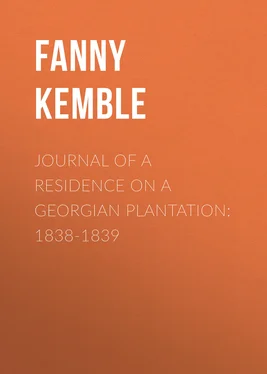Fanny Kemble - Journal of a Residence on a Georgian Plantation - 1838-1839
Здесь есть возможность читать онлайн «Fanny Kemble - Journal of a Residence on a Georgian Plantation - 1838-1839» — ознакомительный отрывок электронной книги совершенно бесплатно, а после прочтения отрывка купить полную версию. В некоторых случаях можно слушать аудио, скачать через торрент в формате fb2 и присутствует краткое содержание. Жанр: foreign_prose, История, periodic, foreign_edu, foreign_antique, на английском языке. Описание произведения, (предисловие) а так же отзывы посетителей доступны на портале библиотеки ЛибКат.
- Название:Journal of a Residence on a Georgian Plantation: 1838-1839
- Автор:
- Жанр:
- Год:неизвестен
- ISBN:нет данных
- Рейтинг книги:3 / 5. Голосов: 1
-
Избранное:Добавить в избранное
- Отзывы:
-
Ваша оценка:
- 60
- 1
- 2
- 3
- 4
- 5
Journal of a Residence on a Georgian Plantation: 1838-1839: краткое содержание, описание и аннотация
Предлагаем к чтению аннотацию, описание, краткое содержание или предисловие (зависит от того, что написал сам автор книги «Journal of a Residence on a Georgian Plantation: 1838-1839»). Если вы не нашли необходимую информацию о книге — напишите в комментариях, мы постараемся отыскать её.
Journal of a Residence on a Georgian Plantation: 1838-1839 — читать онлайн ознакомительный отрывок
Ниже представлен текст книги, разбитый по страницам. Система сохранения места последней прочитанной страницы, позволяет с удобством читать онлайн бесплатно книгу «Journal of a Residence on a Georgian Plantation: 1838-1839», без необходимости каждый раз заново искать на чём Вы остановились. Поставьте закладку, и сможете в любой момент перейти на страницу, на которой закончили чтение.
Интервал:
Закладка:
I have as usual allowed this letter to lie by, dear E–, not in the hope of the occurrence of any event—for that is hopeless—but until my daily avocations allowed me leisure to resume it, and afforded me, at the same time, matter wherewith to do so. I really never was so busy in all my life, as I am here. I sit at the receipt of custom (involuntarily enough) from morning till night—no time, no place, affords me a respite from my innumerable petitioners, and whether I be asleep or awake, reading, eating, or walking; in the kitchen, my bed-room, or the parlour, they flock in with urgent entreaties, and pitiful stories, and my conscience forbids my ever postponing their business for any other matter; for, with shame and grief of heart I say it, by their unpaid labour I live—their nakedness clothes me, and their heavy toil maintains me in luxurious idleness. Surely the least I can do is to hear these, my most injured benefactors; and, indeed, so intense in me is the sense of the injury they receive from me and mine, that I should scarce dare refuse them the very clothes from my back, or food from my plate, if they asked me for it. In taking my daily walk round the banks yesterday, I found that I was walking over violet roots. The season is too little advanced for them to be in bloom, and I could not find out whether they were the fragrant violet or not.
Mr. – has been much gratified to-day by the arrival of Mr. K–, who, with his father, for nineteen years was the sole manager of these estates, and discharged his laborious task with great ability and fidelity towards his employers. How far he understood his duties to the slaves, or whether indeed an overseer can, in the nature of things, acknowledge any duty to them, is another question. He is a remarkable man and is much respected for his integrity and honourable dealing by everybody here. His activity and energy are wonderful, and the mere fact of his having charge of for nineteen years, and personally governing, without any assistance whatever, seven hundred people scattered over three large tracts of land, at a considerable distance from each other, certainly bespeaks efficiency and energy of a very uncommon order. The character I had heard of him from Mr. – had excited a great deal of interest in me, and I was very glad of this opportunity of seeing a man who, for so many years, had been sovereign over the poor people here. I met him walking on the banks with Mr. –, as I returned from my own ramble, during which nothing occurred or appeared to interest me—except, by the by, my unexpectedly coming quite close to one of those magnificent scarlet birds which abound here, and which dart across your path, like a winged flame. Nothing can surpass the beauty of their plumage, and their voice is excellently melodious—they are lovely.
My companions, when I do not request the attendance of my friend Jack, are a couple of little terriers, who are endowed to perfection with the ugliness and the intelligence of their race—they are of infinite service on the plantation, as, owing to the immense quantity of grain, and chaff, and such matters, rats and mice abound in the mills and storehouses. I crossed the threshing floor to-day—a very large square, perfectly level, raised by artificial means, about half a foot from the ground, and covered equally all over, so as to lie quite smooth, with some preparation of tar. It lies immediately between the house and the steam mill, and on it much of the negroes' work is done—the first threshing is given to the rice, and other labours are carried on. As I walked across it to-day, passing through the busy groups, chiefly of women, that covered it, I came opposite to one of the drivers, who held in his hand his whip, the odious insignia of his office. I took it from him; it was a short stick of moderate size, with a thick square leather thong attached to it. As I held it in my hand, I did not utter a word; but I conclude, as is often the case, my face spoke what my tongue did not, for the driver said, 'Oh! Missis, me use it for measure—me seldom strike nigger with it.' For one moment I thought I must carry the hateful implement into the house with me. An instant's reflection, however, served to show me how useless such a proceeding would be. The people are not mine, nor their drivers, nor their whips. I should but have impeded, for a few hours, the man's customary office, and a new scourge would have been easily provided, and I should have done nothing, perhaps worse than nothing.
After dinner I had a most interesting conversation with Mr. K–. Among other subjects, he gave me a lively and curious description of the Yeomanry of Georgia—more properly termed pine-landers. Have you visions now of well-to-do farmers with comfortable homesteads, decent habits, industrious, intelligent, cheerful, and thrifty? Such, however, is not the Yeomanry of Georgia. Labour being here the especial portion of slaves, it is thenceforth degraded, and considered unworthy of all but slaves. No white man, therefore, of any class puts hand to work of any kind soever. This is an exceedingly dignified way of proving their gentility, for the lazy planters who prefer an idle life of semi-starvation and barbarism to the degradation of doing anything themselves; but the effect on the poorer whites of the country is terrible. I speak now of the scattered white population, who, too poor to possess land or slaves, and having no means of living in the towns, squat (most appropriately is it so termed) either on other men's land or government districts—always here swamp or pine barren—and claim masterdom over the place they invade, till ejected by the rightful proprietors. These wretched creatures will not, for they are whites (and labour belongs to blacks and slaves alone here), labour for their own subsistence. They are hardly protected from the weather by the rude shelters they frame for themselves in the midst of these dreary woods. Their food is chiefly supplied by shooting the wild fowl and venison, and stealing from the cultivated patches of the plantations nearest at hand. Their clothes hang about them in filthy tatters, and the combined squalor and fierceness of their appearance is really frightful.
This population is the direct growth of slavery. The planters are loud in their execrations of these miserable vagabonds; yet they do not see that, so long as labour is considered the disgraceful portion of slaves, these free men will hold it nobler to starve or steal than till the earth with none but the despised blacks for fellow-labourers. The blacks themselves—such is the infinite power of custom—acquiesce in this notion, and, as I have told you, consider it the lowest degradation in a white to use any exertion. I wonder, considering the burthens they have seen me lift, the digging, the planting, the rowing, and the walking I do, that they do not utterly contemn me, and indeed they seem lost in amazement at it.
Talking of these pine-landers—gypsies, without any of the romantic associations that belong to the latter people—led us to the origin of such a population, slavery; and you may be sure I listened with infinite interest to the opinions of a man of uncommon shrewdness and sagacity, who was born in the very bosom of it, and has passed his whole life among slaves. If any one is competent to judge of its effects, such a man is the one; and this was his verdict, 'I hate slavery with all my heart; I consider it an absolute curse wherever it exists. It will keep those states where it does exist fifty years behind the others in improvement and prosperity.' Further on in the conversation, he made this most remarkable observation, 'As for its being an irremediable evil—a thing not to be helped or got rid of—that's all nonsense; for as soon as people become convinced that it is their interest to get rid of it, they will soon find the means to do so, depend upon it.' And undoubtedly this is true. This is not an age, nor yours a country, where a large mass of people will long endure what they perceive to be injurious to their fortunes and advancement. Blind as people often are to their highest and truest interests, your country folk have generally shown remarkable acuteness in finding out where their worldly progress suffered let or hindrance, and have removed it with laudable alacrity. Now, the fact is not at all as we at the north are sometimes told, that the southern slaveholders deprecate the evils of slavery quite as much as we do; that they see all its miseries; that, moreover, they are most anxious to get rid of the whole thing, but want the means to do so, and submit most unwillingly to a necessity from which they cannot extricate themselves. All this I thought might be true, before I went to the south, and often has the charitable supposition checked the condemnation which was indignantly rising to my lips against these murderers of their brethren's peace. A little reflection, however, even without personal observation, might have convinced me that this could not be the case. If the majority of Southerners were satisfied that slavery was contrary to their worldly fortunes, slavery would be at an end from that very moment; but the fact is—and I have it not only from observation of my own, but from the distinct statement of some of the most intelligent southern men that I have conversed with—the only obstacle to immediate abolition throughout the south is the immense value of the human property, and, to use the words of a very distinguished Carolinian, who thus ended a long discussion we had on the subject, 'I'll tell you why abolition is impossible: because every healthy negro can fetch a thousand dollars in the Charleston market at this moment.' And this opinion, you see, tallies perfectly with the testimony of Mr. K–.
Читать дальшеИнтервал:
Закладка:
Похожие книги на «Journal of a Residence on a Georgian Plantation: 1838-1839»
Представляем Вашему вниманию похожие книги на «Journal of a Residence on a Georgian Plantation: 1838-1839» списком для выбора. Мы отобрали схожую по названию и смыслу литературу в надежде предоставить читателям больше вариантов отыскать новые, интересные, ещё непрочитанные произведения.
Обсуждение, отзывы о книге «Journal of a Residence on a Georgian Plantation: 1838-1839» и просто собственные мнения читателей. Оставьте ваши комментарии, напишите, что Вы думаете о произведении, его смысле или главных героях. Укажите что конкретно понравилось, а что нет, и почему Вы так считаете.












